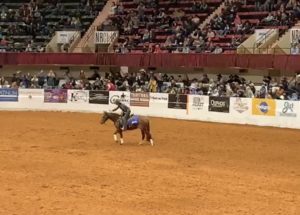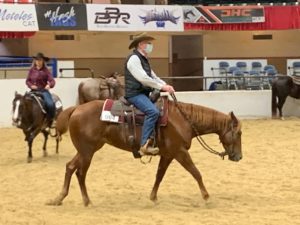
Snaffle Bit Futurity Finals at Half Capacity
No one could have predicted the year 2020 has been. All equine sports have scrambled to adapt in order to continue functioning in the midst of the pandemic. But how has COVID-19 actually impacted the sport of reined cow horse and the community involved with it?
It’s important to recognize that many people have suffered the loss of loved ones and/or endured the illness themselves not to mention dealt with financial hardship. While it’s impossible to know those particular statistics in the cow horse industry, we can investigate other ways it’s been felt.
Allison Walker who is in charge of communications and events for the National Reined Cow Horse Association said the NRCHA did not have to cancel any of their premier events, unlike other sports. They managed to reschedule and change locations, but all of the events were held in 2020, which was a major feat in itself.
Walker said they were very lucky to be able to sell tickets to the Snaffle Bit Futurity Finals, though the City of Fort Worth limited capacity in the Will Rogers coliseum to 50%. There were some premier events that had to be closed to the public.
The NRCHA postponed the Stallion Stakes held at South Point Casino in Las Vegas, Nevada and moved the Derby from Paso Robles, California to Scottsdale, Arizona. They also moved the Eastern Derby to Memphis, Tennessee to accommodate health safety protocols.
Despite the shutdown and hardships from COVID-19, surprisingly, the industry reported major growth.
“Our entry counts were not down, stall counts were not down, participation was not down. It was really hard for us not to have the crowds there especially for our open riders on finals night. That really drives and motivates them to put on a good show… We experienced a minimum of a 30% growth at all of our premier events this year, the Eastern Derby was actually up 150% this year,” Walker said.
Walker said she thinks this growth has been coming for a longtime. The NRCHA has been on the uphill climb in regard to membership, they haven’t plateaued or climaxed yet.
“Horses are still in training, people are still taking lessons and they need a place to show those horses. We heard from a lot of people, not knowing when the next horse show was going to happen, they really capitalized on being able to attend a premier event.”

A Rider Wearing a Mask in Will Rogers
Going forward, the NRCHA has changed the world show qualifications. It has moved the NRCHA Derby to Arizona for the next three years and the Eastern Derby to Memphis, Tennessee since the old venue was not able to handle the growth of the event.
“It’s a lot of work behind the scenes and my hats are off to every venue and hosting facility to make sure people can earn a living.”
Walker said that South Point Hotel, Casino and Spa bent over backwards to ensure the rescheduled Stallion Stakes went ahead.
“They set the standard for the entire industry. What they have done to accommodate having events there was incredible. We were actually the only show in Las Vegas happening at the end of August.”
Walker said they had taxi drivers that were bringing people to South Point and they knew they were there for the “cowboy event” since it was the only event happening in Las Vegas. There were no concerts, no events at all.
South Point had thermal scanners for everyone to walk through, extra cleaning and staff counting people in the building and reporting back to the Gaming Commission and County Commission. The hotel was inspected while the Stallion Stakes was taking place to observe them following the rules.
South Point Hotel, Casino and Spa owner, Michael Gaughan, used the Stallion Stakes as an example to try to help reopen Las Vegas Walker said. Walker attributes the success of the event and health protocols to South Point which took on the monitoring itself.
When it comes to the horse market, COVID-19 has had no downward impact on prices. Jeremy Barwick, owner of Western Bloodstock and co-owner of Brazos Valley Stallion Station, said sales are up.
“As far as horse prices, they have been higher this year! I haven’t seen any negative effects [in horse sales].”
But again, it has forced Western Bloodstock to change the way it does business. Barwick added online bidding so more people can purchase horses without having to travel. The auctions take place in real time, and they have received a lot of positive feedback.
“…I think I will keep [online auctions] from now on. Some people are just more comfortable staying home and bidding on one. A lot of people have done their homework ahead of time so they are comfortable bidding on the horse online.”
At the NRCHA Snaffle Bit Futurity Sale, 70% of bids were online. That just helps the prices Barwick said. The snaffle bit sale was up 22% with a 94% clearance rate.
Other than the required changes like wearing masks, Western Bloodstock had to move all sales during the NCHA Futurity and Snaffle Bit Futurity to the Watt Arena instead of the John Justin Arena, to allow room for social distancing.
“Even back at the breeding barn, I thought that our breeding numbers were going to plummet. We bred more mares than we’ve ever bred,” said Barwick.
“Broodmares have really shocked me. That’s typically your weakest market, [the demand] started last year and has carried on this year, but the market has been strong,” he added.
It’s a trend Jim Ware, owner of Triangle Horse Sales has also experienced despite having to reschedule one of their annual sales three times.
They were finally able to have their auction at the AQHA World Show in Oklahoma City in November. Ware said it was a great success with the top sale netting $100,000.
“We had 471 horses lotted [not including the outs], 85% of them sold and averaged over $10,000. With that number of horses, that’s a big sale. It was a big two day sale with a lot of people there.”
During the downtime, they had a lot of time to think about how to continue doing business within the restrictions of COVID-19.
Triangle Sale has a great reputation for its fun atmosphere for bidders and its hospitality which in the past made Ware hesitant about going online.
“You cannot duplicate [that festive feeling] in online sales.”
However, with COVID restricting their events, Ware decided it was time to offer online sales. Triangle’s first such auction was a special offering of historic bloodlines produced by Oxbow Ranch and renowned trainer Lindy Burch.
“If you can create a market with the online sale where you can sell weanlings or sell embryos and not have to wait until they are a year old, you are money ahead,” he said.
Ware believes online sales will offer great opportunities for a lot of people and help attract new buyers without taking the place of in-person sales.
Ware said the pandemic and the shutdown in particular, reminded him of 9/11. “…it was totally different, but at the same time the world stopped.”
“In the fall of 2001, we had gathered the best set of horses, unbelievable mares in the sale like Meradas Little Sue and some other great mares. We were just worried to death because as it turned out consigners decided not to sell because the market wouldn’t be good. What we found out that year was the market was incredible and we set an all time record with Meradas Little Sue and the others. There were a lot of people that had money in the stock market or other investment means. They took that money out of those other investments and decided to spend some of it. We had incredible sales.”
“I encouraged people to be calm about COVID-19 since I had seen it first hand and sweated through it and worried through it. So I knew it could be good or it could be bad. Turns out, it has been good.”
Ware added that the 6666 Ranch’s Return To The Remuda sale in October was one of the best it had been.
“It has not had a negative effect, thus far, on the market in any way.”
